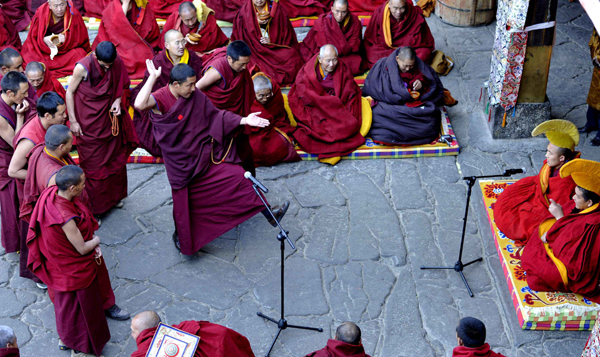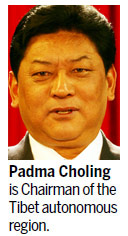Government and Policy
Tibet's achievements celebrated
By Hu Yongqi and Dachiog (China Daily)
Updated: 2011-03-28 07:28
 |
Large Medium Small |
LHASA - Padma Choling, chairman of the Tibet autonomous region, delivered a speech on Sunday to the Tibetan people in celebration of the Third Serfs Emancipation Day and promised more efforts for a new Tibet that is stable, united, democratic and well-developed.
 An accreditation ceremony is held in Lhasa's Jokhang Temple on Saturday. Eight monks were certified to be Gashe, the highest level of attainment for monks studying the scriptures of Tibetan Buddhism, during the service. [Photo/China News Service] |
During the past 52 years since the end of the serfdom, the autonomous region has seen great achievements in economic and social development, the chairman said.

Tibet's GDP increased to 50.75 billion yuan ($7.8 billion) in 2010, up by 12.4 percent annually since 2005. The net income of farmers and herdsman per capital rose to 4,318 yuan, almost double that of 2005. And more than 1.43 million people benefited from a government-funded housing project for farmers and herdsmen.
At the end of last year, Tibet's population had increased to 2.93 million. And the life expectancy of Tibetan people reached 67 years, almost double the 35.5 years that it was prior to the liberation of Tibet.
Padma Choling also said the livelihood of urban and rural residents has improved because Tibet was one of the first parts of the country to provide free compulsory education.
|
||||
"All the achievements should be attributed to the socialist system and the leadership of the Communist Party," said the chairman.
In 1959, the 14th Dalai Lama and his supporters staged a rebellion. The central government foiled it and initiated a democratic reform to end the slavery system in Tibet.
"The democratic reform conducted 52 years ago abolished the cruel and brutal serfdom that existed to exploit the Tibetan people for thousands of years. The reform freed 1 million serfs and allowed the Tibetan people to enjoy legal rights and interests," Padma Choling said.
"Tibet belongs to China. But the Dalai Lama and his supporters have been attempting to separate Tibet from China and restore the feudal serfdom. His conspiracy is doomed to failure. The sky in Tibet will forever belong to the Tibetan people and Tibet will always be part of China as it has been."
This year marks the 60th anniversary of the peaceful liberation of Tibet.
He also sent his greetings and thanks to all people who have been supporting the development of Tibet in the speech.
Tibetan legislators endorsed a bill in 2009 to designate March 28 as Serfs Emancipation Day, marking the date on which about 1 million serfs in the region were freed half century ago.
In 1959, the central government dissolved the aristocratic local government of Tibet and replaced it with a preparatory committee for establishing the Tibet autonomous region.
| 分享按钮 |



